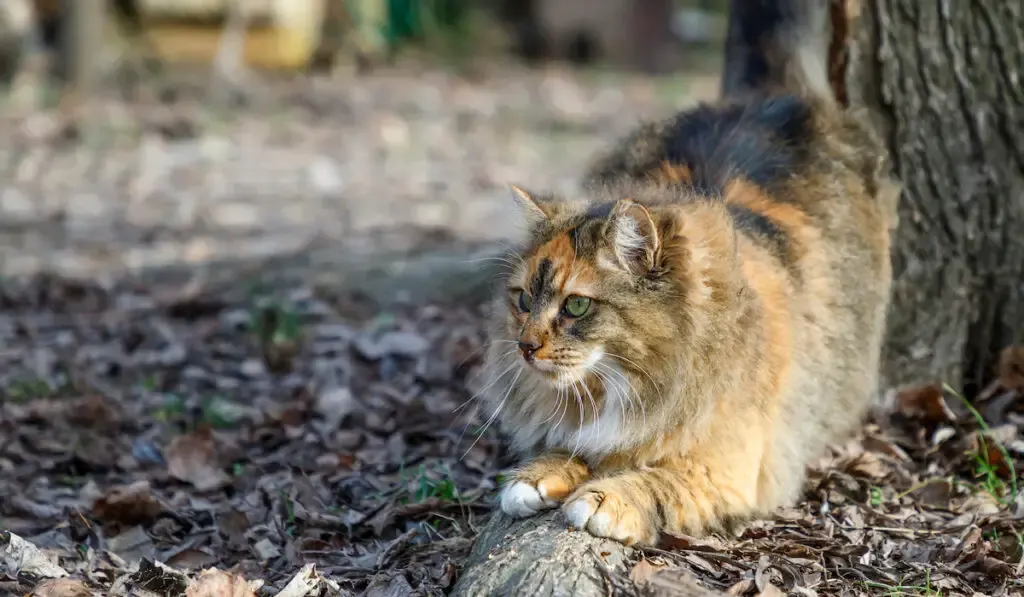Skunks are wild animals, and not many people know much about their temperament. So, if skunks recently started invading your property, it is only right that you worry about the safety of your cat. But then, will skunks truly attack your cats? Let us find out.
Table of Contents
Do skunks attack cats?
Skunks do attack cats. However, such attacks only come when the animals encounter each other.
Skunks do not set out to hunt for cats. But if a skunk invades human homes and property where there is a cat, the cat may get aggressive toward the skunk, causing the skunk to be defensive. In trying to defend itself, the skunk may attack and spray the cat.
Below, we give a thorough answer to the question of skunks attacking cats. So, go over the article to understand why a skunk may attack your cat.
Why Do Skunks Attack Cats?
A skunk may attack a cat when the cat threatens it. If a skunk gets in your outdoor area with your cat in the same place, the cat may become hostile to the invader. The skunk, in turn, will try to defend itself. But in trying to protect itself, it may inevitably attack your cat.
A skunk may also attack a cat when they are after prey. This is unlikely to happen with domestic cats and more likely with feral cats, but it is a possibility.
What Happens When Skunks Attack Cats?
The Cat May Subdue the Skunk
Cats are natural hunters, and they are often the same size or larger than skunks. So, there is a good chance that they will harm skunks when they attack. But then, skunks are no pushovers; they can harm your cat significantly in a fight.

The Skunk May Cut the Cat
Skunks have long claws, and they can use these to make deep lacerations on your cat. Clearly, if your cat gets a deep cut, it may start bleeding heavily.
Besides bleeding, the cat may get an infection from the laceration, especially if the skunk carries parasites or microbes in its claws.
If the cat survives the complications of getting cut by the skunk’s claws, it may end up with a nasty scar.
The Skunk May Spray the Cat
Besides their long claws, skunks may hurt your cat by spraying them. Typically, a skunk’s spray will only irritate your cat and leave it stunned temporarily.
In mild cases, if the spray gets in your cat’s eyes, the eyes will become itchy and red. Then if the cat inhales the skunk’s spray, it may vomit and sneeze multiple times.
In severe cases, if skunk spray gets in your cat’s eyes, the cat may go blind. Also, the spray may cause anemia.
At the mildest, the skunk’s spray may only make your cat smelly. Luckily, you can remove most of this smell with some home remedies.
You may try removing the smell of the skunk spray by doing the following:
- Mix 2 teaspoons of liquid dish soap with 4 cups of 3% hydrogen peroxide and ¼ cup of baking soda.
- Wear rubber gloves and work the mixture into your cat’s fur.
- Leave the mixture on the cat for some minutes, then rinse it off.
- Ensure you do not leave the mixture in for too long, or you may bleach the cat’s fur.
- The mixture may not get all the smell out at once. So, you may have to repeat the steps again.
- Do not prepare the mixture for storage as it may explode when stored.
If you already have skunk odor remover at home, you do not need the home remedy above. Also, if you do not have hydrogen peroxide and baking soda at home, try working the smell out with a tomato juice recipe.
Note that tomato juice is not as effective as the hydrogen peroxide-baking soda mixture in removing skunk smell.
The Cat May Get Rabies
While skunks can cut or spray your cat, your biggest concern should be rabies transmission.
Alongside bats and raccoons, skunks are amongst the top 3 most rabid animals.
Skunks transmit rabies through their saliva. So, if they bite your cat during an attack, they may transmit the virus to your feline.
Sadly, if your cat is exposed to rabies, the chances of survival are slim. Rabies is typically fatal, especially when the virus is already in the nerves.
If your cat is exposed to a potentially rabid bite, get it to a vet. The veterinarian will inform the animal disease regulatory authority. Then they may euthanize the cat or keep it under strict quarantine after treatment for many months.
Euthanasia and strict quarantine are the choices here because a rabid cat is dangerous to everyone else.
Note that you can get rabies too. So, try to avoid getting bitten by a skunk. Also, if you think your cat may have a rabies infection, do not let it bite you.

Do Skunks Kill Cats?
As we hinted already, no skunk goes looking to kill a cat. But as you may have seen in the previous paragraphs, skunks can kill cats indirectly (for example, through a rabies infection).
Skunks are unlikely to fatally wound grown cats in a fight. But they can kill kittens easily. Of course, unless you or the parent cat is not around, skunks are also unlikely to kill kittens.
The main reason skunks can kill kittens is the size difference. So, never leave your cats and kittens outdoors unattended if a skunk is around your home.
Ordinarily, skunks eat small rodents and insects. But sometimes, if they kill a kitten, they may eat it. Still, this is very unlikely.
Final Thoughts
Skunks do attack cats. A skunk may not back down if a cat threatens it; it will try to defend itself, and in doing so, it may attack the cat.
If your cat has contact with a skunk, you should take them to visit the vet to make sure they have not been harmed or infected with any diseases the skunk may have.
Still, when skunks can, they will avoid cats.
Resources
- https://www.pestshero.com/do-skunks-attack-cats/
- http://wildliferemovalusa.com/skunkattack.html
- http://www.skunkpestcontrol.com/catdead.html
- https://vcahospitals.com/know-your-pet/skunk-spray-and-your-dog
- https://animals.mom.com/rabies-skunks-2796.html
- https://www.cdc.gov/rabies/location/usa/surveillance/wild_animals.html
- https://vcahospitals.com/know-your-pet/rabies-in-cats
- https://www.thesprucepets.com/cat-sprayed-by-skunk-4774735
- https://animals.mom.com/how-to-remove-skunk-odor-from-a-cat-without-bathing-it-12340928.html
- https://www.answers.com/Q/Do_skunks_eat_kittens
